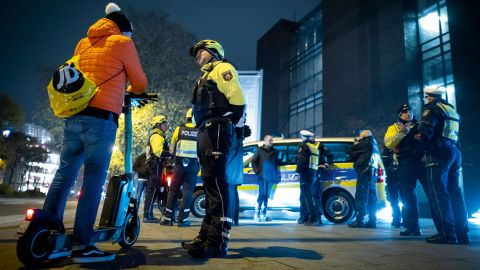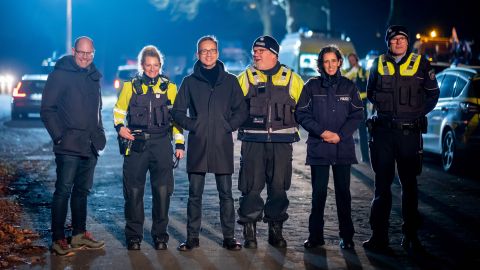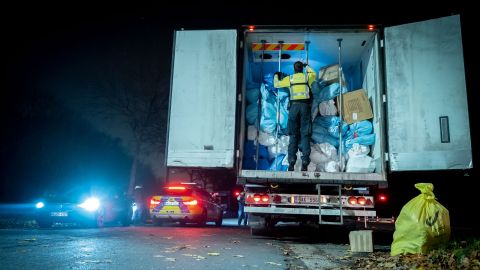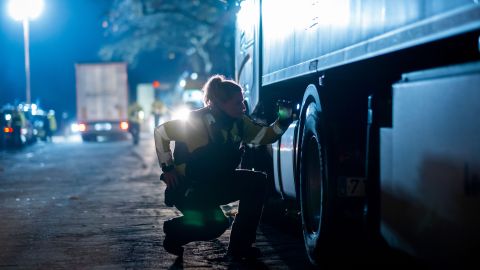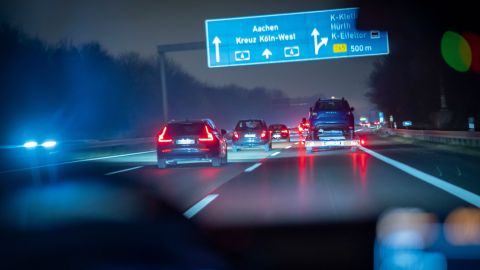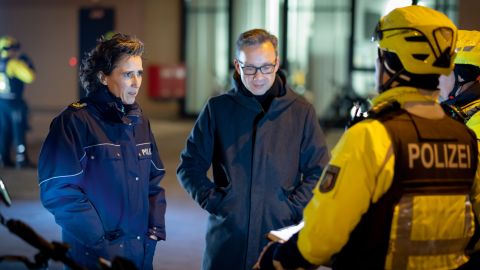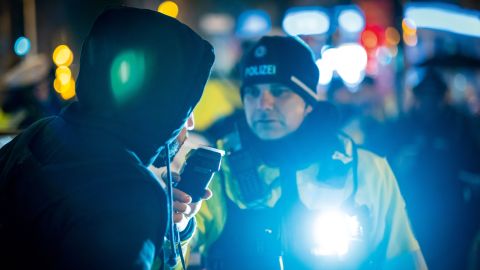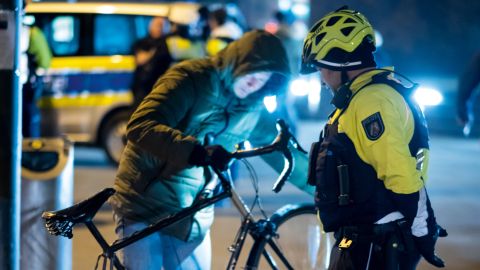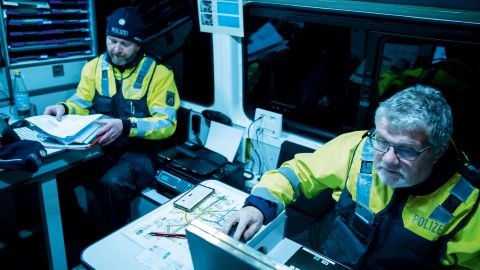An icy Saturday evening, the third weekend of Advent: On the A555 highway, just past the Rodenkirchen interchange, the dark gray sky swallows the last remnants of daylight as early as 4:30 in the afternoon. A hundred meters behind the Burger King, the streetlights stop, and behind them only the headlights of the cars shine into the darkness. On weekdays, up to 80,000 vehicles use three lanes of traffic here, heading towards the Kölner Ring and back again in the evening. A traffic junction that is a hotspot for a special traffic check on this day. At 5.30 p.m., employees of the highway maintenance department have closed the left lane and colleagues from the riot police have set up huge floodlights in a parking bay. The "BAO ROADPOL" starts in 30 minutes. More than 80 traffic police officers will be on the road throughout Cologne, checking drivers in the places where crashes are most frequent.
The European Roads Policing Network (ROADPOL) has called for the "Alcohol and Drugs" operation in 27 countries.
Unprotected e-scooter riders who glide home on two wheels after a night of partying are particularly at risk. The other mega-trend in traffic: the increasing number of truckers thundering along the highways around Cologne with 450-horsepower articulated lorries and delivery deadlines on their necks. According to estimates by the Federal Ministry of Transport, commercial traffic will increase by 39 percent by 2030.
6 p.m., parking bay at the Rodenkirchen interchange: The highway police control teams have now arrived there. Their blue and yellow Sprinters are parked between two 40-ton trucks from Romania and Spain. One driver has to deliver 1,470 tires to Toyota in France, the other is transporting mandarins for discount stores in the Rhineland. Outside, the headlights are now so bright that the officers from the heavy goods group can even read driving licenses and measure tire profiles. Colleagues boot up computers in the vans. Where the back seats would normally be, they have set up a mini-office where they can check personal details, vehicle documents, freight certificates, company licenses and driving and rest times.
In five hours, the night driving ban for trucks begins. Group leader Katrin Hoffmann fears: "This will put some companies and therefore their drivers under additional pressure." Goods and parcels have to be delivered on time.
No time for rest periods. No time to secure the load properly. No time for repairs. "And then when an overtired driver overlooks the end of a traffic jam and the brakes fail ..." The chief inspector doesn't get to the end of the sentence because her radio crackles at that moment. The colleagues at their observation post on the A4 have spotted a conspicuous articulated lorry: "Driver is driving fast. Semi-trailer is leaning heavily to the right, lurching." There it is, the typical case - or hopefully not. The inspection will show. Hoffmann says: "Bring him in." - And somehow already suspects that this very truck will keep her team busy for some time.
6.30 p.m., police headquarters on Walter-Pauli-Ring: At around the same time as the "PLEASE FOLLOW" lights up red in the freeway police patrol car, the operational leaders of "BAO ROADPOL" are getting ready to leave from the office of Frank Wißbaum, head of the Traffic Directorate. They have discussed the final details and are now off to meet their colleagues, who will be pulling out 272 vehicles on the streets of Cologne until the early hours of the morning and recording 13 traffic offenses and 85 administrative offenses.
Police President Falk Schnabel and the head of the police department from the Ministry of the Interior, Gerrit Weber, are also present. At the meeting, they mainly talked about one group of road users that they are particularly concerned about: the so-called "vulnerable", pedestrians, cyclists and, increasingly, e-scooter riders, where the number of accidents is rising dramatically. Especially on the typical party days - Friday and Saturday - younger people in particular are admitted to hospital with traumatic brain injuries or shoulder and collarbone fractures. In 2021 alone, there were 400 just in Cologne. 80 percent of them had too much alcohol in their blood. "The figures are explosive," says Schnabel. And Gerrit Weber adds: "Mobility is changing. We have to adapt to this. Education is important. Checks can ensure greater safety."
According to Cologne's accident statistics, the number of people injured in road traffic was lower than ever in 2022, but more than 4,900 people were hospitalized by 31 October. More than 2,800 of them were on two wheels or on foot. "Once drunk in a car, now drunk on an e-scooter," says Maria del Carmen Fernandez Mendez, Head of the Traffic Department at the Ministry, summing up the problem. Everyone agrees: "E-scooter accidents must not become the new disco accidents."
7.05 p.m., Rodenkirchen roundabout: The highway police patrol car and truck driver Hassan L. (41) arrive at the checkpoint at the traffic circle in Rodenkirchen. The diesel engine of the 40-ton truck rumbles briefly at idle, then stops. Katrin Hoffmann and her team are already waiting. Hassan L. has a Turkish passport and transports parcels from the Netherlands to Austria for a Czech haulage company - including many orders from online shoppers. The highway police inspectors already know what that means: pressure. He has to transport the goods more than 1,000 kilometers within 24 hours. Katrin Hoffmann sighs: "The drivers' working conditions are often catastrophic."
When the inspectors open the door of the 25-metre-long trailer, they are met by heavy sacks. The load is not secured at all. It is the first of a total of nine violations that the officers will find, including missing driving permits and non-compliance with rest periods. In the end, the haulier has to pay a security deposit of 13,000 euros to release the truck.
7.15 pm, Rautenstrauch-Joest-Museum, near Neumarkt: "This is incredibly dangerous," curses a police officer from the Cologne bicycle squadron. Two hours ago, he and nine other colleagues cycled to Cologne's hotspot for traffic offenders. His team has just picked up two young people from an e-scooter who were riding on the wrong side of the road. A reprimand and a warning: 20 euros.
Electric scooters arrived in Germany from America a good four years ago and are now part of Cologne's cityscape. "80 percent of accidents are self-inflicted," says Chief Police Director Wißbaum and announces priority checks every Friday and Saturday on the party miles and in Cologne's old town. What hardly anyone knows: if you get on an e-scooter while drunk, you can quickly lose your driver's license.
9 p.m., at the Köln-Süd freeway junction, heading towards Aachen and the Dutch border: Benny Feist (44) and Armin Strunz (54) concentrate on the cars on the A4. Not much going on. On a normal day, there are more than 40,000 cars on the road here. A souped-up Mercedes passes by: lots of horsepower, wide tires, double exhaust pipe. There are often cars like this on the scene. Some technical modifications can cause the operating license to expire. Feist fixes the license plate and reads out: AC for Aachen, followed by letters and numbers. His partner Strunz sits in the passenger seat and runs the license plate through a data check program on his laptop on his lap. Unobtrusive.
The plainclothes officers are part of a ten-strong team from the Frechen highway police. They don't need a satnav, they know all the roads, interchanges and parking lots around Cologne. They also know the tricks of the drug couriers who are smuggling in more and more cocaine and amphetamines from the Netherlands and Belgium via the A4.
Strunz and Feist drive up to 500 kilometers in a day - including this evening. They are overtaken by a FIAT van near Düren. Feist mumbles the license plate number, Strunz types. Hit! The photo of a 34-year-old man with a long criminal record appears on the computer: several violations of the Narcotics Act, various burglaries in warehouses. During the last robbery, he had a blank-firing pistol with him. And then suddenly everything happens very quickly.
21:36, near the Kerpen junction: Feist presses the accelerator. They overtake the white van. "PLEASE FOLLOW" lights up red in the rear window. At the same time, another mid-size car emerges from the darkness and pursues the suspicious van. In it are chief inspectors Jonas Zehnpfennig (34) and his partner Jessica Meinerzhagen (26). Together with Feist and Strunz, they form a quartet. A quick message over the radio and they strike together. They head for the nearest parking lot.
"It's a bit like looking for a needle in a haystack," says chief inspector Meinerzhagen. But there are also many successes: for example, one who had stuffed hundreds of euro bills into a sports bag because the false bottom in the trunk was already full. He had a million euros with him.
Back to the white van at the Düren freeway junction. The van is clean. "Strange, strange," says Chief Superintendent Feist. The team sets off again on the A4 to search. The Cologne police officers often had the right instinct: for example, four drink and drug driving offences were uncovered, almost 30 speeding violations were punished and 13 traffic offenses were detected, more than half of them for driving without a license. One of these was committed by a 15-year-old who had also forged his mother's signature in order to register the car. The night of operations is something to be proud of.
